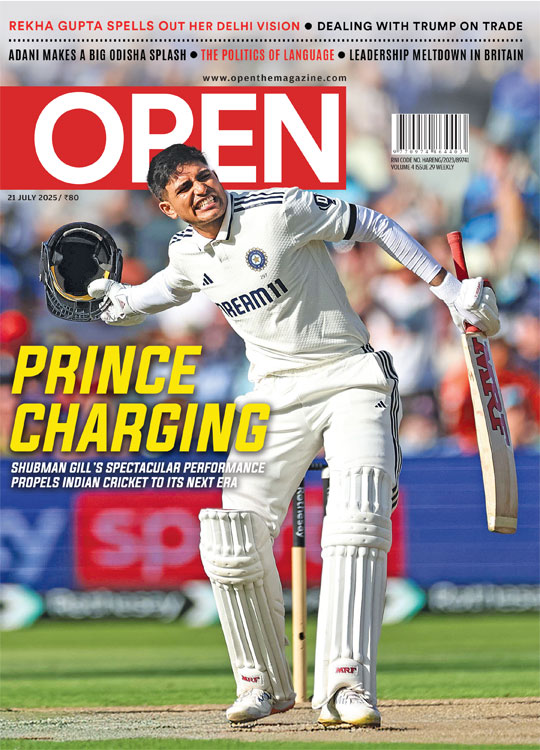‘Let’s Share the Cock’
Prospective grooms say the darndest things. Nandini Krishnan gathers stories of hilarious adventures of women in the bizarre world of marriage arrangement
 Nandini Krishnan
Nandini Krishnan
 Nandini Krishnan
|
21 Aug, 2013
Nandini Krishnan
|
21 Aug, 2013
/wp-content/uploads/2015/11/true-marriage.jpg)
Prospective grooms say the darndest things. Nandini Krishnan gathers stories of hilarious adventures of women in the bizarre world of marriage arrangement
There are some women, and I must include myself in this lot, who believe that a groom hunt can be a series of traumatic experiences. Of course, one knows sensible people who have had arranged marriages to each other, but sometimes a good match can seem like something that only happens to other people. Most women I know have had at least one terrible encounter. The good thing about these is that they’ll give you plenty of stories to tell.
The gentleman missed-caller
While I didn’t meet anyone in the arranged marriage circuit face-to-face, I did consider a proposal from someone I had met through work. I was 22 years old, and had just got a well-paying job after returning to India with a Master’s degree. When the person in question told me he was in love with me—at our third work-related meeting—and wanted to marry me, I told him to speak to my family, since I was neither attracted to him nor put off by him. That state of affairs would change when I came out of the studio one day to find seven missed calls from him. When I called back, apologised for missing the calls and asked what was wrong, he replied, sounding puzzled, “No, no, those were meant to be missed calls. Journalists get reimbursed for their phone calls, no? I have to pay my own phone bills, so I thought we’ll communicate this way.”
Locked-in
Manisha Bhave was doing her MPhil, when a family friend tried to set up a match.
“He had passed out of some random management institute in Ghaziabad. I was only 23, and I had no plans of looking for a groom. Apparently, she didn’t even tell my mom this was a ‘ladki dekhna’ or ‘meet karna’ party, so I was clueless. But I could sense something was wrong. Suddenly, this family friend pushes me and this guy into their bedroom, so we can ‘talk’! I was so spooked out. The guy gave me his résumé as an introduction. I found it really odd that we couldn’t talk in the main hall—and this is aside from being angry at the way I’d been entrapped—so I decided to get out of the room. I realised only when I couldn’t push the door open, and had to knock, that the latch had been drawn and we’d been locked in!”
Manisha’s mother was horrified when she realised her friend had locked the girl in with a stranger. “Mom tried to tell herself the friend was being helpful, though she didn’t like the locking-in part at all. I swore I wouldn’t step into that friend’s house ever. It shouldn’t happen to anyone!”
The shaadi mandi
When Akanksha Mehra heard the mother of a prospective groom was coming to meet the family before the couple would be allowed to meet, she decided to stay out of the way. “I found it somewhat strange that she wanted to come and meet the family before I met the guy. Obviously, my intention was to let my parents do the talking, and to stay in my room. Suddenly, she asked to see me, and it took my parents by surprise, so they didn’t think [they could] say I was out.”
When she went downstairs, the mother of the boy looked her up and down, and asked her height. Apparently, her son was tall, and had said he would not marry anyone who was shorter than 5 feet 6 inches.
“Then, she asked if I usually tie my hair up or leave it loose. I was like, is she going to want to count my teeth next?” Akanksha says, with a shake of the head. “It felt like one of those sabzi mandis, where the aunties break the ends of the bhindi, toss the tomatoes to test them and smell the onions.”
The Malayali Frank Zappa
Shreya Gopal’s first meeting with a prospective groom was in 2007. She refused to wear a sari, and her parents settled for a salwar-kameez. “I think they were relieved I didn’t insist on sitting there in shorts and a T-shirt. But anyway, there was this pennu kaanal [‘bride seeing’ in Malayalam] atmosphere, and that’s how the madness started. My house was spring-cleaned and spruced up, and all the stuff that was considered junk was packed away and stuffed into the balcony, and everything else that was considered unsightly was stuffed under the bed. Basically, all excess fat was trimmed. The house looked spic and span, but you look under the bed or the balcony, and you would see everything that went into making a disastrous house.”
Ironically, this would become a metaphor for her interactions with the boys who were uniformly ‘tall, fair, good-looking, highly qualified’, and often turned out to be podgy men with soft stomachs and oil dripping through wisps of hair. The first pennu kaanal started off on a sour note. It was May Day, and Shreya had just started working. So she and her colleagues had planned a fun day out, to be topped off with a movie. She was resentful about having to cancel on them. Her brother, who had made his own plans with college friends, wasn’t happy either.
“So both of us were sulking about how this had been sprung on us. The bell rang. I, of course, don’t know how to be coy, so I opened the door myself and went, ‘Hello, how are you?’ My mother is standing and wondering what was wrong with her daughter. And I’m wondering what was wrong with my family. This guy had a Frank-Zappa-style seventies’ handlebar moustache, and he was dressed up really strange—shiny formal shirt with jeans, and really shiny formal shoes. And I could smell the coconut oil on his hair from where I was standing. I was like ughhhhhhhh . . . so, I went to the kitchen, and said, ‘Thankfully, he’s taller than me, at least.’”
They were asked to get to know each other. “There was literally nothing about him that I could get excited about. His idea of reading was the newspaper. And his idea of partying was, ‘I party, but only with boys’ and I’m like . . . what?! And then he looks at me and goes, ‘Your eyebrows have a really nice shape. Do you go to the parlour, like every day or every week or something, what’s the story?’”
The shape of her eyebrows altered at that question, and Shreya told him it was none of his business.
“Then, he said something about how he doesn’t like to talk, his mother’s the talker in the family, and he would rather be left alone. I’m like umm, maybe you shouldn’t marry a girl like me if you just want to be left alone? So I kept asking him questions, and he gave me monosyllabic answers, and finally he comes up with, ‘See, when I marry a girl, she has to have one hundred per cent character.’ I have no idea what he meant by that.”
It turned out he had already met his idea of the perfect bride. He went on to describe her to Shreya, emphasising her ‘one hundred per cent character.’
“And I’m thinking ‘Why didn’t he just marry her, what is he doing in my house?’ Then I realised she must have rejected him too, because he’s boring, he doesn’t talk, he doesn’t read, he doesn’t watch TV, and he doesn’t know what not to say either. I mean, he suddenly saw my brother sitting and laughing with everyone else, and Sigmund Freud went, ‘Hey, your brother’s a bit of a flirt, right?’ And I’m wondering, ‘Where the hell did this come out of?!’ I’m trying to steer the conversation to neutral territory, about whether he reads, and what he likes to do, and here he is, asking if my brother’s a flirt. I gave him this one look, and just then my aunt called me in from the kitchen to serve the tea. The kitchen, of course, was the hub of all the conversation. As soon as I went in, she said, ‘That weirdo is not becoming a son-in-law of this house.’ I was so glad there was at least one person who was on the same page as I. Because they came through a family friend, and everyone wanted it to work out—he’s such an intelligent boy, and so good-looking, and this is a match made in heaven and blah blah blah, and I just wanted to say to everybody, ‘Have you, like, met him?’”
Shreya knew she would have to spend the rest of her life justifying to herself why she’d married him, and she didn’t want to do that.
The Coke-and-Bull story
Shreya had no intention of entertaining any more prospective grooms at home. And so, her father arranged for them to meet at a club.
“I kid you not. He was two inches shorter than me. I was wearing flats, and he was wearing those sidey platform heels. So, when my dad said, ‘You guys talk, I’m going for a swim’, I was like oh, no, please don’t do this! Anyway, the waiter came up, and this guy ordered two Red Bulls. I’m like, excuse me, I’d rather have a Coke, thank you for asking.”
When the drinks finally arrived—by which time Heels had asked her about her hobbies—he realised the Red Bull wasn’t cold enough.
“I’m sipping my drink, and suddenly, I hear this voice going, ‘Let’s share the cock’. I nearly choked. And then I saw he was pointing at my drink.”
Shreya doesn’t remember much else from the encounter, except for her relief at her father’s return. However, they weren’t rid of Heels yet. It turned out he expected them to drop him back.
The deformity theorist
Next, Shreya was registered [at] a marriage bureau which asked for a full-length photograph. Since she wasn’t likely to agree to dress up for a studio photograph, her father seized the opportunity at a wedding they had gone to. Half-amused and half-annoyed, she posed. “So, we sent off this picture. And I kid you not, the father of a groom wrote in, asking whether I was hiding a deformity. Apparently, my arm was folded. That’s the level of scrutiny to which some families subject brides. I had to stop my dad from calling this guy up to give him a piece of his mind.”
Photoshopped into America
Since the marriage bureaus usually sent couriers addressed to ‘Father of Shreya Gopal’, she and her brother got into the habit of opening the packages and scrutinising the proposals.
Their efforts paid off when they found a photograph of a boy wearing a sherwani, with his arm around his mother.
“They were obviously at a wedding. But the background is this industrial place, with a hip-looking bus stop. We found it weird. And then I noticed this was a flash photograph of the boy and his mother. And then you have this background in broad daylight. So, basically the parents wanted to convey that he was in the US right now, and so they’d Photoshopped an American background into this. And it was… umm… well, we laughed our heads off.”
The mute witness
Devyani Khanna says one of the weirdest encounters she has had was with a man who simply wouldn’t talk. “It makes you paranoid. When you take time out of your day to meet a potential partner, you hope for a pleasant meeting—or, at the very least, an interesting one. You aren’t prepared for stony silence.”
This is what happened. “So, I went and sat. We said hi-hello. And then, he wouldn’t talk. He simply wouldn’t talk. When he had to answer, he’d mumble something, and I had to strain my ears to hear. It was literally like sitting across a stone. I tried talking to him for two minutes, five minutes, seven minutes, ten minutes, and then I gave up and decided, go to hell. We each ordered our food, and then I sat silent. Finally, he asked one or two questions. In half an hour or so, our food was done, we didn’t talk at all, and we left. I was so pissed, I didn’t even say nice-meeting-you or whatever. That sort of scars you, because you’ve taken some trouble for this day, applied for a day off, some of your friends know, your family knows, it’s an emotional investment, it’s an investment of your time, and then you meet someone like this. It pisses you off.”
Extracted from Hitched: The Modern Indian Woman and Arranged Marriage by Nandini Krishnan, Random House India

/wp-content/uploads/2025/07/Cover-Shubman-Gill-1.jpg)











More Columns
Shubhanshu Shukla Return Date Set For July 14 Open
Rhythm Streets Aditya Mani Jha
Mumbai’s Glazed Memories Shaikh Ayaz